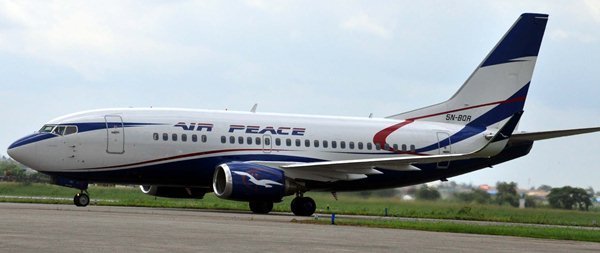*Airlines Lament Losses over Cancellation of Election
By Obinna Chima, Goddy Egene, Chinedu Eze and Chris Uba

The decision by the Independent National Electoral Commission (INEC) to postpone the presidential and National Assembly elections earlier scheduled for yesterday, will cost businesses in the country about $7.605 billion (N2.737 trillion).
The aforementioned amount is about two per cent of the country’s Gross Domestic Product (GDP), which is about $427 billion.
Some states had declared work-free day on Friday, which has clear economic implication on the state.
In addition, many businesses and financial institutions also operated half day last Friday because of the elections, just as the three tiers of government deployed their personal to special assignment on the elections.
More so, university lecturers as well as international observers had been deployed to states, lodged in hotels, were they were to observe and monitor the elections. All these have dire cost implication on the economy.
Speaking in a telephone chat with THISDAY yesterday, the Chief Executive of the Financial Derivatives Company Limited, Mr. Bismarck Rewane, listed the costs associated with the postponement of the elections to include direct cost, disruption cost, opportunity cost, consequential cost and reputational cost.


Rewane explained: “With Nigeria’s GDP at about $427 billion, divide that by 365 days, you will get the GDP per day of $1.170 billion.
“So, the fact that everybody stopped work today (Saturday), there is a direct cost of $1.170 billion. Then, there is the disruption cost.
“Disruption cost is that you multiply the daily cost by three. That is because if I had booked a wedding today and now I have to shift the date again. So, that is $1.170 billion multiplied by three.
“Then, there is what is called the opportunity cost. That is, the things people would have done today, which is about 50 per cent of the direct cost. Then, there is what is called the consequential cost, which is usually twice the direct cost. “That is a total of almost $8 billion, which is about two per cent of Nigeria’s GDP.”
Furthermore, he identified reputational cost, which according to him, could not be quantified.
This has to do with the damage the election postponement would have done to the country’s reputation considering, especially from the perspective of foreign investors and the foreign election observers.
“We have investors that have made their projections about this election and they never factored in this postponement,” he said,” just as he expressed disappointment over the development.
“Normally, if you have a project, you ought to be reviewing it every day. So, the fact that they (INEC) knew and announced the postponement five hours to the election, shows total lack of preparedness and it is disappointing.
“But the hope is that what they haven’t achieved in four years, we can achieve in seven days. Our hope is that they would do something dramatic.
“Remember that in 2015, the outcome was more important than the process, but in 2019, the process is more important than the outcome. Therefore, if for any reason, what you have done is to jeopardise the process, it only makes the fact that there is going to be a contest by all aggrieved parties after the election.
“So, the costs are mounting and the clock is ticking and we hope the clock is not a time bomb,” Rewane warned.
Airlines Count Loses
Major Nigerian airlines: Air Peace, Arik Air and Dana Air cancelled a total of 145 flights with a projected revenue loss of about N290, 000, 000 on Saturday, due to the sudden postponement of the elections.
The airlines decried the situation the announcement for the cancellation was done as it did not give them any chance to at least prepare to operate some flights later in the day.
THISDAY learnt that airlines earn about N2 million revenue from high load factor of a Boing B737 for one hour flight, which could be higher, depending on destination. So, the airlines which largely operate medium size aircraft for their domestic flights incurred the loss aforementioned revenue in addition to the fact that it would still pay its crew and other services for the day they did not work.
The Corporate Communications Manager of Air Peace, Chris Iwarah, told THISDAY that the airline cancelled about 90 flights, including domestic and regional services.
He said what was so painful about the cancellation was that the same number of flights would be cancelled next Saturday and the airlines are obliged to refund their passengers 100 per cent of their fares, despite the fact that banks have collected their commission on the payment.
“We cancelled about 90 flights today. This is a huge loss to our operations, but we take it as sacrifice for the stability of the country, but the sacrifice amounted to nothing when the election was cancelled.
“Our customers will come for refund and we will pay them their fare 100 per cent despite the fact that banks have taken their commission and next week we will do the same thing. We sent messages to all out customers about the cancellation and directed our offices in the town to remain closed for security reasons,” he said.
Iwarah, said the impact of the cancellation would not be felt for one day, but would continue to recur for the next six months. According to him, if the announcement for the postponement had come earlier, the airline would have adjusted its schedule and operate some flights.

Also, spokesman of Arik Air, Adebanji Ola, who spoke in the same vein, said the airline cancelled about 45 flights and noted that although five days before Saturday, Arik Air had notified its customers about the cancellation of Saturday flights but passengers still bought tickets because ticket purchase is already in the system and regretted that similar cancellation would be done next Saturday and March 9, 2019, which would be a huge loss for the airline.
On his part, the Head of Communications at Dana Air, Kingsley Ezenwa, told THISDAY that the airline cancelled about 10 flights but expressed the hope that it would operate Lagos-Abuja and Lagos-Port Harcourt in the evening of Saturday.
THISDAY






